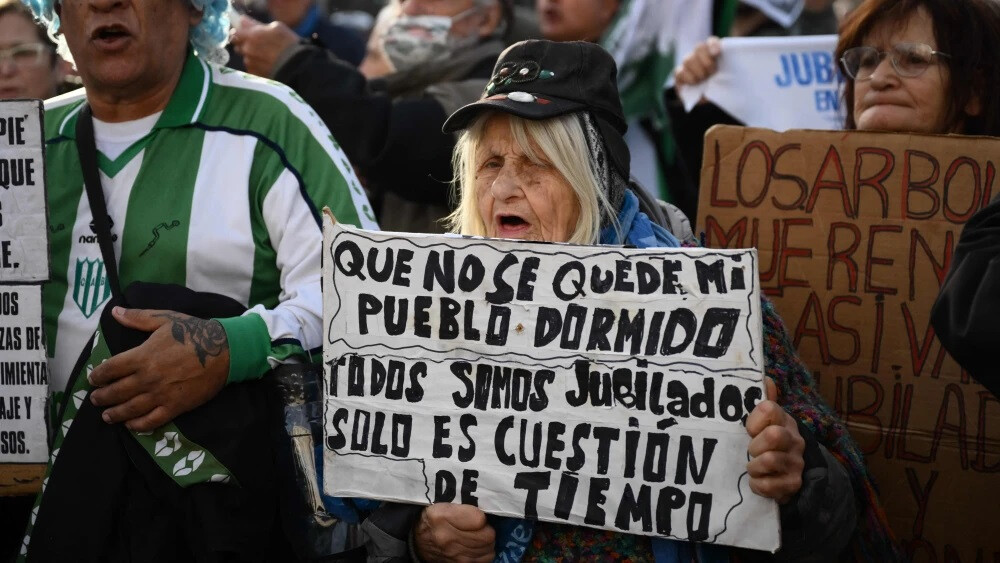
Social organizations and healthcare professionals in Argentina have joined the weekly protests held by pensioners in front of the National Congress. Their demands for pension increases coincide with a 24-hour strike at a major national pediatric hospital, highlighting the escalating social tensions in the country.
These demonstrations are a direct response to the economic policies of the ultra-liberal President Javier Milei, with continuous street protests from various sectors demanding wage increases. While President Milei boasts about cutting fiscal spending and achieving a budget surplus, these policies have caused significant pain across society.
Pensioners' Cry: "A Struggle for Survival"
Alicia Toroija, a 78-year-old retiree, told AFP, "I retired a year ago, but I'm still getting the same salary as on the first day," revealing her current pension is $270 (approximately 370,000 KRW). According to the Elderly Rights Advocacy Group (Defensoría de la Tercera Edad), the basic cost of living for a pensioner is $1,000 per month (approximately 1,380,000 KRW). Toroija relies on her children's help to make ends meet and participates in protests every Wednesday, which starkly illustrates the severe economic hardship faced by Argentinian pensioners.
The Milei government has focused on controlling inflation, successfully reducing it from 211% in 2023 to 118% in 2024, and further to 1.5% in May 2025. Additionally, Argentina's Gross Domestic Product (GDP) increased by 5.8% year-on-year in the first quarter of 2025. However, these macroeconomic improvements are a result of massive fiscal austerity and cuts in public spending, leading to a decrease in purchasing power, especially for civil servants and pensioners who rely on the state pension system. The unemployment rate in the first quarter of 2025 rose to 7.9%, a 1.5 percentage point increase from the previous quarter, suggesting that economic growth is not evenly benefiting all segments of society.
Healthcare System in Crisis: "Best Healthcare, Worst Wages"
Healthcare professionals at Hospital Garrahan, a top-tier pediatric hospital in Buenos Aires, have also gone on strike demanding wage increases. After months of protests led by resident doctors, approximately 4,000 medical staff members at Garrahan Hospital joined the strike this Wednesday, amplifying their voices.
Banners held by the medical staff read, "Best healthcare, worst wages." The current monthly salary for resident doctors is around $600 (approximately 830,000 KRW), falling short of the average monthly cost of living for a four-person household, which is $1,000. These poor working conditions and low wages raise concerns about the potential collapse of Argentina's public healthcare system. Garrahan Hospital is a crucial medical institution where patients are referred from across Argentina and neighboring countries. It recently demonstrated high-level medical expertise by successfully performing in-utero surgery for fetal congenital malformations, resulting in a successful birth.
Government spokesperson Manuel Adorni criticized the strike in a press conference, accusing it of being orchestrated by "a small number of privileged union members" and claiming it was "disrupting and making it difficult" for Garrahan Hospital to provide care. However, the medical staff refute the government's accusations, stating their demands for fair wage increases and improved working conditions are legitimate and that the government's criticism ignores reality.
Rising Social Discontent: "The Shadow of Austerity"
In addition to the protests by pensioners and healthcare workers, several unions marched towards the 'Ministry of Deregulation and State Transformation,' responsible for the downsizing and restructuring of state-owned enterprises, in downtown Buenos Aires this Wednesday. This demonstrates widespread opposition to the Milei government's massive cuts in state spending and privatization policies.
Social tensions in Argentina are intensifying as the Milei government's austerity measures directly impact the lives of ordinary citizens. While the government's goals of curbing inflation and achieving a budget surplus are important, the resulting increase in unemployment, decline in purchasing power, and deterioration of public services cast a deep shadow over Argentinian society. As the conflict between the government and protesters escalates, Argentina's socio-economic stability is being tested.
[Copyright (c) Global Economic Times. All Rights Reserved.]






























